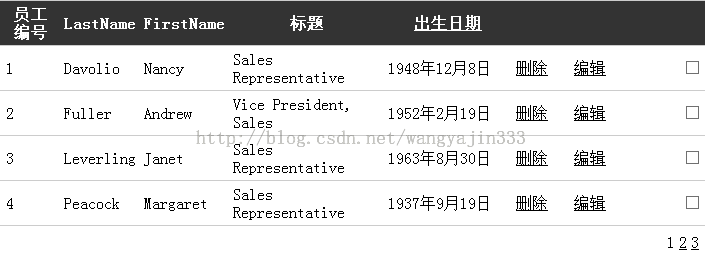由于Asp.Net視頻比較舊,涉及到的數(shù)據(jù)綁定控件DataGrid在VS2012中已經(jīng)沒有了����,取而代之的是GridView。開始覺得視頻中的例子沒法實(shí)現(xiàn)了����,其實(shí)不然��,DataGrid里面的功能GridView里一樣都不少�,只是形式變化了一下,仔細(xì)研究一下發(fā)現(xiàn)它們是換湯不換藥啊�����。
(一)DataKeyName屬性
(1)DataKeyNames一般都是用來對當(dāng)前行做唯一標(biāo)示的,所以一般為數(shù)據(jù)庫的ID����。
(2)GridView.DataKeys[e.RowIndex],e.RowIndex是獲取事件對應(yīng)的行���,GridView.DataKeys[e.RowIndex]就是獲取對應(yīng)行的唯一標(biāo)示也就是DataKeyNames所指定列的值��。
(3)DataList和Repeater是沒有的該屬性的��。
在代碼中這樣使用:(定義的該函數(shù)在下面都需要調(diào)用)
/// summary>
/// 實(shí)現(xiàn)數(shù)據(jù)綁定功能
/// /summary>
private void BindToDataGird()
{
SqlConnection con = DB.CreateCon();
SqlDataAdapter sda = new SqlDataAdapter();
sda.SelectCommand = new SqlCommand("select employeeID,FirstName,LastName,Title,BirthDate from employees ", con);
DataSet ds = new DataSet();
sda.Fill(ds, "emp"); //將查詢到的數(shù)據(jù)添加到DataSet中�����。
this.GridView1.DataKeyNames =new string[]{ "employeeID"}; //DataKeyNames的使用
this.GridView1.DataSource = ds.Tables["emp"];
this.DataBind();
}
如何取值����?
DataKey key = GridView1.DataKeys[e.RowIndex];//其中e為GridViewDelete(或者Edit)EventArgs e
string empID = key[0].ToString();
(二)分頁
由于GridView中封裝了分頁的功能���。這里實(shí)現(xiàn)起來很容易���。先需要設(shè)置屬性:AllowPaging/PageSize/PageSetting��。然后編寫事件代碼:
protected void GridView1_PageIndexChanging(object sender, GridViewPageEventArgs e)
{
this.GridView1.PageIndex = e.NewPageIndex;
this.BindToDataGird();
}
(三)排序
首先設(shè)置AllowSorting屬性為true.事件代碼:
protected void GridView1_Sorting(object sender, GridViewSortEventArgs e)
{
if (ViewState["order"] == null) //使用ViewState設(shè)置雙向排序�。
{
ViewState["order"] = "ASC";
}
else
{
if (ViewState["order"].ToString() == "ASC")
{
ViewState["order"] = "DESC";
}
else
{
ViewState["order"] = "ASC";
}
}
//數(shù)據(jù)綁定顯示
SqlConnection con = DB.CreateCon();
SqlDataAdapter sda = new SqlDataAdapter();
sda.SelectCommand = new SqlCommand("select employeeID,FirstName,LastName,Title,BirthDate from employees ", con);
DataSet ds = new DataSet();
sda.Fill(ds, "emp");
ds.Tables["emp"].DefaultView.Sort = e.SortExpression + " " + ViewState["order"].ToString(); //設(shè)置排序
this.GridView1.DataSource = ds.Tables["emp"].DefaultView; //將表的默認(rèn)視圖作為數(shù)據(jù)源�。
this.DataBind();
}
(四)刪除
這里需要注意一點(diǎn):就是獲取某一行的主鍵值。
protected void GridView1_RowDeleting(object sender, GridViewDeleteEventArgs e)
{
DataKey key = GridView1.DataKeys[e.RowIndex];
string empID = key[0].ToString();
SqlConnection con = DB.CreateCon();
SqlCommand cmd = new SqlCommand("delete from employees where employeeID= '"+empID+"'" , con);
con.Open();
cmd.ExecuteNonQuery();
this.BindToDataGird();
}
(五)編輯(更新和取消)
protected void GridView1_RowEditing(object sender, GridViewEditEventArgs e)
{
this.GridView1.EditIndex = e.NewEditIndex;
this.BindToDataGird();
}
protected void GridView1_RowCancelingEdit(object sender, GridViewCancelEditEventArgs e)
{
this.GridView1.EditIndex = -1; //設(shè)置索引值為負(fù)取消編輯�����。
this.BindToDataGird();
}
protected void GridView1_RowUpdating(object sender, GridViewUpdateEventArgs e)
{
DataKey key = GridView1.DataKeys[e.RowIndex];
string empID = key[0].ToString();
string lastName=((TextBox)(GridView1.Rows [e.RowIndex ] .Cells [2].Controls [0])).Text ; //將GridView中某列中控件強(qiáng)制轉(zhuǎn)換為TextBox�,然后取出它的值。
Response.Write(empID +"" + lastName ); //用于測試��。
this.GridView1.EditIndex = -1;
this.BindToDataGird();
}
附結(jié)果圖:

小結(jié):數(shù)據(jù)綁定控件:Reapter/DataList/GridView的功能成遞增關(guān)系�����,都使用到了模板����。所以掌握模板很重要。視頻使用模板大都是使用控件���,不是代碼??偢杏X這里需要學(xué)習(xí)的地方還有很多�����。需要做例子鞏固使用����。
您可能感興趣的文章:- GridView自動增加序號(三種實(shí)現(xiàn)方式)
- C#處理datagridview虛擬模式的方法
- C#中datagridview的EditingControlShowing事件用法實(shí)例
- C#中GridView動態(tài)添加列的實(shí)現(xiàn)方法
- C#實(shí)現(xiàn)DataGridView控件行列互換的方法
- C#實(shí)現(xiàn)綁定DataGridView與TextBox之間關(guān)聯(lián)的方法
- C#中DataGridView常用操作實(shí)例小結(jié)
- C#實(shí)現(xiàn)3步手動建DataGridView的方法
- asp.net中GridView數(shù)據(jù)鼠標(biāo)移入顯示提示信息
- C#中DataGridView動態(tài)添加行及添加列的方法
- 如何用jQuery實(shí)現(xiàn)ASP.NET GridView折疊伸展效果
- ASP.NET GridView中加入RadioButton不能單選的解決方案
- DataGridView展開與收縮功能實(shí)現(xiàn)
- GridView控件如何顯示序號